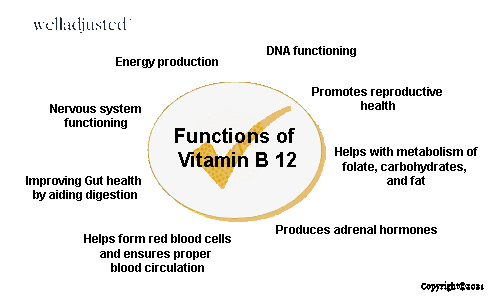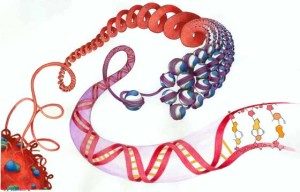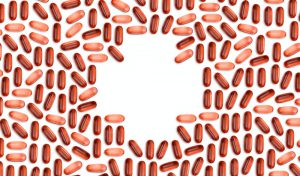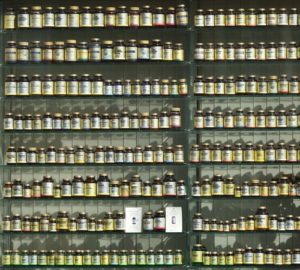 The wide variety of vitamins and minerals that we need in our daily diet can be confusing and overwhelming. It can be harder again with the multitude of diets or eating regimes that are now popular. If we commit to one style of eating we may wonder – will we be meeting all of our nutritional needs? For example, did you know that vitamin B12 is pretty much exclusively found in foods that are derived from animals? Vitamin B12 is incredibly important to our overall health and hence why there is now hot debate on this between those who champion the ancestral type diet, and those who advocate a vegan diet.
The wide variety of vitamins and minerals that we need in our daily diet can be confusing and overwhelming. It can be harder again with the multitude of diets or eating regimes that are now popular. If we commit to one style of eating we may wonder – will we be meeting all of our nutritional needs? For example, did you know that vitamin B12 is pretty much exclusively found in foods that are derived from animals? Vitamin B12 is incredibly important to our overall health and hence why there is now hot debate on this between those who champion the ancestral type diet, and those who advocate a vegan diet.
Personally, I believe that any diet done well, has its health benefits. Likewise, any diet carried out poorly, can be detrimental to one’s health. I also believe that it is incredibly important to tune into how our body is responding to our diet at anyone time, and use this feedback as our compass. Meaning that if you are not thriving on a vegan diet or a meat-eating diet, then listen to that. Versus listening to the guilt laden voice in your head that says you must eat one way, year in, year out.
If you live somewhere incredibly cold then Chinese Medicine practitioners are likely to suggest that raw foods eaten in a cold climate, may be too taxing on your spleen. Likewise, if your body has been busy having babies, then eating meat for a period of time may be innately what your body needs you to do. At other times you may crave lighter plant-based foods. Our body is always giving us feedback which may well mean that you choose to be vegan for a period then a meat eater, and then a vegetarian, or vegan again. These decisions need to serve our health rather than any diet trend. Too often we defer to someone else and their advice, rather than tuning into our own bodies, looking at our energy levels, our sleep, our stress, our gut strength, genetics and our environment, to innately choose foods that deeply nourish us.
Let’s now learn about vitamin B12 and why it is such a crucial vitamin. We’ll also explore what the signs of deficiency are, how to get tested and and who’s at risk of a deficiency. We’ll also see if there’s merit to what some say about the best sources of vitamin B12.
So Why Is Vitamin B12 So Important?
Vitamin B12 also called ‘cobalamin,’ is one of the eight B vitamins. It plays an essential role in maintaining our health and wellbeing. It is a co-enzyme that is vital for many processes in the body.
You may be wondering “What’s an enzyme again?”
Enzymes are proteins (not the protein that we eat but a chain of amino acids) that act as catalysts and help to speed up chemical reactions. Co-enzymes work to assist enzymes. Vitamin B12 is a co-enzyme for two essential enzymes: methionine synthase + methyl malonyl-CoA mutase.
What does that mean?
Vitamin B 12 overseas 1:
- the synthesis of deoxyribonucleic acid (DNA) which is essential in proper gene expression.
- homocysteine being recycled back into methionine via methylation process.
Homocysteine is a naturally occurring amino acid found in blood plasma. High levels of homocysteine in the blood are believed to increase the chance of heart disease, stroke, Alzheimer’s disease, and osteoporosis. Vitamin B 12 works as an antioxidant (removing harmful by-products of metabolism, such as homocysteine.)
Vitamin B 12 also overseas 1:
- the synthesis of fatty acids
- the synthesis of myelin sheaths (which surround nerve cells and are needed for accelerating nerve conduction and nerve insulation)
- aids in the production of haemoglobin (which is a protein that transports oxygen through the blood) and therefore assisting in the formation of red blood cells.
 Overall vitamin B12 plays a major role in:
Overall vitamin B12 plays a major role in:
- DNA functioning
- Energy production
- Metabolism
- Nervous system functioning
- Gut health – aids digestion
- Helps metabolize folate, carbohydrates, and fat
- Helps to form red blood cells.
- Ensures proper circulation
- Produces adrenal hormones.
- Promotes reproductive health.
These are clearly all vital functions.
What are the Signs to look for with a Vitamin B12 Deficiency?
Is afternoon fatigue getting the best of you? Do you wake up with no energy? While these feelings are incredibly common, they are NOT normal. In fact, regular fatigue may mean you are suffering from vitamin B12 deficiency.
Symptoms of Vitamin B12 deficiency include…6
Early symptoms include:
- paleness
- overall weakness and fatigue
- easy bruising
- anaemia caused by B12
- weakness and/or fatigue
- headaches
- jaundice/yellow skin or eyes
- a sore mouth and tongue, including mouth ulcers, or tongue
- stomach
- constipation (or diarrhea)
- confusion
- poor concentration and forgetfulness
- reduced appetite
- fertility issues
- pins and needles, tingling in the hands
- shaky hands or spastic movement in general,
- lack of co-ordination
- unsteady gait
- symptoms can mimic aging (often dismissed as natural or “normal”)
- memory loss and dementia
- blurred vision
- sleeping disorders
- heart palpitations
- depression
- incontinence
Vitamin B12 helps fight depression –getting enough vitamin B12 supports brain health and positive mood. Observational studies have found that approximately one-third of patients who are admitted for clinical treatment of depression are deficient in vitamin B12.11
Vitamin B12 protects against cardiovascular disease –vitamin B12 helps regulate levels of homocysteine, a byproduct of protein metabolism. High levels of homocysteine have been linked to a higher risk of heart disease, stroke, and dementia.12, 13
Vitamin B12 protects against eye disease and disorders – vitamin B12’s ability to bring down homocysteine levels benefits not only your cardiovascular system and your brain but your eyes as well. Elevated homocysteine levels appear to increase the risk of a number of eye-related diseases, including (warning: list of medical jargon coming up) retinopathy, cataracts, optic atrophy, retinal vessel atherosclerosis, and pseudoexfoliative glaucoma maculopathy (I don’t recommend trying to say this five times fast).14
And that’s not all. Age-related macular degeneration is associated with both high homocysteine levels and low levels of vitamin B12. The good news is that vitamin B12 and folate supplementation can be helpful in helping elderly people reduce the high homocysteine levels that can lead to eye disease. 15
As you can see vitamin B12-deficiency may cause symptoms related to your nerves. This is called vitamin B12 neuropathy. It may affect your movement and sensation, especially in your legs, cause numbness or pins and needles and decrease your sensitivity to touch, vibration, or pain. It can also cause confusion, depression, poor concentration, and forgetfulness – symptoms that can mimic dementia.
Severe cases of deficiency of B12 can lead to dementia and even death if not rectified.
Children with B12 deficiency are particularly at risk with permanent damage to their development including:
- delays in motor skill development
- significantly reduced problem-solving.
- decreased spatial ability
- diminished overall ability to
If severe deficiency is experienced prior to conception and during pregnancy, the consequences of low B12 can include growth retardation.
Additionally, the first couple of years of a newborn’s life are super important and regarded as the most critical time for brain development especially through neural myelination.3 It is therefore especially important for the mothers to have these vitamins available for the newborns.
 Lack of B12 – Is This Why You Are Anaemic?
Lack of B12 – Is This Why You Are Anaemic?
As we have discussed vitamin B12 is needed to make red blood cells and for your brain and nervous system to function properly. If it is in short supply, your body will make fewer red blood cells, they will be abnormally large, and they will not last for as long as they should. Without enough red blood cells your tissues and organs will not get enough oxygen and you will develop a condition called anaemia.
There are several types of anaemia with different causes. Low iron is a common cause, but insufficient vitamin B12 is another, and sometimes this type of anaemia is also called megaloblastic anaemia.
Who’s at Risk for Being Vitamin B12 Deficient?
- Pregnant women- Mild vitamin B12 deficiency is common in pregnancy and due to increased foetal demand over gestation, 38% of women have low B12 levels by the time of delivery.2 Early recognition is critical because deficiency in pregnancy has been associated with neural tube defects, infertility, preterm birth, and low neonatal birthweight.2,3
- Babies whose mothers had a B12 deficiency during pregnancy may have increased odds of developing type 2 diabetes, as well as other serious metabolic problems, later in life.
- Vegans/vegetarians- Plants-based diets when done properly, offer amazing health benefits however like in any foodie group – some vegans/vegetarians lack diversity in their diets or consume cheap false foods like meat-free chicken or meat-free sausages. Not knowing how to source vitamin B 12 with a vegetarian and vegan diet can lead to deficiency as it appears to be solely concentrated in animal’s tissues and is found only in food of animal origin.1
Although this vitamin is stored in excess in the liver for around 2-3 years, dietary insufficiency’s such as being on a strict vegan diet for a prolonged period may result in 1 deficiencies. We discuss more in a moment.
- Elderly- With age comes a gradual decline in our body’s ability to absorb and process the food we digest. The degeneration of the digestive system is common with increased age and may be the backbone behind many deficiencies such as Vitamin B12. 1
- Those with malabsorption issues- Even if we consume an adequate dietary intake of this vitamin, vitamin B12 bioavailability is dependent on an individual’s absorption capacity. To absorb dietary B12in the small intestine, we need adequate stomach acid, the enzyme pepsin and a gastric protein called intrinsic factor. Very common health issues such as reduced stomach acid, compromised protein digestion, lack of pancreatic enzymes, and autoimmune disorders, can all cause disruption in the absorption process.
Between 10 to 30 percent of people over 50 years old produce too little stomach acid, leading to decreased absorption of B12 from food.1Think of this malabsorption as a clog in the pipe. Vitamin B12 malabsorption may also come from:
-
- Previous surgery on the stomach or intestinal tracts
- Gastritis or inflammation of gastric mucosa
- Autoimmune diseases, including type 1 diabetes or pernicious anaemia (B12 deficiency may go unrecognized if anaemia is mistakenly attributed to other causes such as iron deficiency).
- Crohn’s disease or other chronic bowel inflammatory conditions
- HIV
- Some medications- Proton pump inhibitors, H2 blockers, diabetes drug metformin can interfere with the absorption process.
- Family history of associated diseases
- If you have a common gene issue!
If you have a vitamin B12 deficiency bear in mind it may relate to your genes!! We have an estimated 20,000 genes, and one of those is the MTHFR gene. MTHFR is a gene that provides the body with the instructions for making a certain enzyme called methylenetetrahydrofolate reductase (MTHFR). When you eat foods containing vitamin B12, MTHFR converts it into its active form Methyl-cobalamin which is critical to methylation. Methylation is a highly important process which basically alters the body’s chemistry by allowing some internal switches (i.e., bodily receptors) to turn on and off to promote homeostasis. Methylation processes are central to our physical, emotional, and mental wellbeing.
Unfortunately, 30-60 percent of all people carry an MTHFR gene variant which may lead to low levels of B-vitamins, and high levels of homocysteine in the blood (homocystinemia).4 Homocysteine is an amino acid that the body produces by breaking down dietary proteins. High levels of homocysteine can damage blood vessels and lead to blood clots.
 People who have high homocysteine levels tend to have low levels of vitamin B12.4 You may not know you have a MTHFR mutation unless you experience severe symptoms such as poor coordination, abnormal blood clotting, developmental delays, numbness or tingling in the hands and feet.4,7 There are several signs our body gives us when our methylation is off, make sure you have a read of our blogs on methylation for further understanding, namely “MTHFR – Say What?” and “Methylation, MTHFR – WTF?.”
People who have high homocysteine levels tend to have low levels of vitamin B12.4 You may not know you have a MTHFR mutation unless you experience severe symptoms such as poor coordination, abnormal blood clotting, developmental delays, numbness or tingling in the hands and feet.4,7 There are several signs our body gives us when our methylation is off, make sure you have a read of our blogs on methylation for further understanding, namely “MTHFR – Say What?” and “Methylation, MTHFR – WTF?.”
*A final word here on genes and I discuss this further in the methylation blogs. I believe it is foolish to blame our genes for our health outcomes. Yes our genes made load the gun but as the saying goes, our environment pulls the trigger. We can always work to rectify our environment and the triggers that may be compromising our gene expression.
So, What Can You Do to Improve Your B12 Status?
Obviously, diet is going to play a major role here. Let’s look at the food sources of vitamin B 12 and then the underlying arguments amongst foodies and experts.
The first step we can take to increase our intake is to eat high quality B12-rich foods like:
- Grass-fed Liver – Organ meats are some of the most nutritious foods out there. Liver and kidneys, especially from lamb, are rich in vitamin B12. A 100-gram serving of lamb liver provides an incredible 3,571% of the Daily Value (DV) for vitamin B12.1
I aim sneak small portions of liver into one of our meals at least once a week. I believe liver to be quite the superhero food. Have a read of our blogs on liver here. Literature suggests that raw liver contains the highest form of B12, not that we are suggesting this delicacy but the cultures who include raw meats in their diets, certainly meet their B12 quota. Liver is a wonderful healthy food however erroneously labelled as unhealthy by conventional nutritional circles, but you will need to research eating it raw and decide if it is safe for you. For example, if you are pregnant, I would recommend cooking liver.
Other sources of B12 include:
- Fish- especially clams/oysters, sardines, and tuna. Salmon and trout are also high in B vitamins as well as omega-3 fatty acids.
Clams may be a richer source of vitamin B12 than liver (see below)
- Grass fed beef and lamb – grilling or roasting is better than frying as it preserves the Vitamin B12 content.5 Interestingly considerable loss of B12 has been reported after cooking beef, pork, and chicken meats.
- Grass fed Pastured eggs
- Grass fed Dairy products -cheese, yoghurt, milk
Raw dairy has more B12 than pasteurized milk and the milk proteins that assist with absorbing the B12, are not denatured like they are in the pasteurization process. Raw dairy is not legal in many parts of the world, which is worth investigating for yourself.
Beef liver 70.7 mcg per 3 ounces
Fortified breakfast cereals 6.0 mcg per 1/2 cup
Salmon 4.8 mcg per 3 ounces
Trout 3.5 mcg per 3 ounces
Yogurt 1.1 mcg per cup
Ham 0.6 mcg per 3 ounces
Eggs 0.6 mcg per hard-boiled egg
Chicken breast 0.3 mcg per 3 ounces
Are There Are Still Nutritious Options for Vegetarians and Vegans?
Despite the animal origin of Vitamin B12, vegetarians have several options to ensure they are having the recommended dietary intake. These include eggs and dairy products. Vegans however have a more limited list of options with some health websites suggesting the following: breakfast cereals, non-dairy milks, meat substitutes, rice, nutritional yeast, and energy bars. But you needn’t have much health knowledge to appreciate that most of these foods are not life-giving nor nutritious. The B12 in brewer’s yeast also called nutritional yeast, is due to factory fortification. In other words, it is a synthetic source and not naturally occurring in the food. The same applies to the breakfast cereals and energy bars.
Dig deeper and some websites add mushrooms, algae, or seaweed options which we discuss further in a moment. Soy is also considered a good source of VitaminB12. However, we generally do not recommend soy products as most soy is genetically modified food (GMO), which works to erode our gut health and general wellbeing. From our other blogs on soy you will find soy also functions as a phytoestrogen – effecting our hormones, which is never advantageous when we are hoping to create and maintain hormonal balance.
So, let us look further into the hot debate between food camps. Firstly, some experts maintain that contrary to claims by the vegan community, usable vitamin B12 is not available in any plant foods. That it is not available in algae like spirulina or tempeh (a fermented soy product). Claiming that the B12 found in these foods is like true B12, but it is not the same thing. Studies have indicated that the B12 found in algae and tempeh are not bioavailable to the human body and blood levels of the nutrient did not change for participants even after algae or tempeh were added to the diet. Furthermore, their concerns deepen saying that B12 imposters, can inhibit the absorption of true vitamin B12 putting those who avoid animal foods at an even greater risk for deficiency.9
Proponents of the B12 in plant foods however like to point out that Hindus from India do not seem to suffer from any B12 deficiency despite their diet which includes no animal foods. However when some of these vegan Hindus moved to England, they quickly develop B12 deficiency symptoms with no change in diet. Those favouring ancestorial diets respond by outlining that this is because, in India, the plant foods consumed by vegans include many insects and insect larvae due to the lack of pesticide use and inefficient cleaning methods. In England, insects and their residues are completely removed from plant foods before they are consumed, thus removing the tiny and yet plentiful animal foods that were serving to preserve the Hindu vegans’ health in their homeland.9
Further to this some vegan websites say that, “It is extremely difficult for a diet, vegetarian or not, to supply the necessary amounts of B12 to humans. And this is because vitamin B12 is obtained directly or indirectly from bacteria and is NOT produced by animals or plants.”9 Claiming that our body cannot create this vitamin, but it must host the bacteria that can. Therefore, eating foods that have direct contact with the soil, such as roots, grasses, etc., can help increase B12 levels in the body by taking in active bacteria, which can produce this vitamin in our intestine. They are not suggesting that we should consume greens without washing them first but that washing does not completely remove the bacteria which they claim are the producers of the vitamin. Enough of which settles in our intestine and produces B12.
They continue that farmed animals are usually fed with standardised foods. As a result, they do not receive enough B12 either, since these foods do not contain the bacteria that produce it. So, the highly advertised meats rich in B12, are derived from animals that receive vitamin supplements through their diet or they are simply given to them in injectable form.9
This argument assumes that our gut bacteria create vitamin B12 which I will touch on in a moment, but it is also assuming that commercial farming processes result in the depletion of soil nutrients, use pesticides and antibiotics, and are raised in unhygienic, unnatural ways. All of which is true, but what then of the animals raised with organic farming methods? Organic animals who graze and live outside, are raised free of pesticides and antibiotics, and are grass fed? There is no doubt that meat eaters must commit to high quality produce and support organic farming methods, if not to support this industry, but their own health.
And finally some argue that because commercial meat is a poor source of vitamin B 12, vegans are no more deficient than other people who eat meat. With studies on population groups who consume diets rich in meat yet who are vitamin B 12 deficient being discussed. Adding that researchers found that consumers could not easily absorb B12 from processed foods yet they could however, absorb it in a supplement form. This makes sense when we look back at all the reasons both genetic and non-genetic (lifestyle) that we outlined earlier in this blog which can inhibit an individuals ability to absorb vitamin B12 whether they are a meat eater or not.
Hopefully you can glean why it’s important to examine food debates rather than merely adopting someone else’s rationale or argument as your own.
So, Can Our Gut Bacteria Produce B12 or not?
Science to date tells us that vitamin B12 is indeed an “essential” vitamin because our body cannot produce it and it must come from an outside source. The original source of B12 in nature is bacteria. Some nutritional sources confuse the issue by maintaining that beneficial B12 is able to be synthesized by gut flora in the colon of humans. While this may be true, the B12 that is produced this way is apparently not in a usable form. Very little if any of this B12 is able to be absorbed across the walls of the large intestine or colon. The reason being is that the bacteria produced B12 in the gut is not attached to the “intrinsic factor” (IF), a special protein that is secreted in the stomach.9
B12 must attach to an intrinsic factor protein to be absorbed effectively. This happens when B12 that is eaten or consumed, binds with the intrinsic factor that has been broken down by pancreatic enzymes in the small intestine. The tightly bound B12-intrinsic factor complex then moves through the gut to the Ileum or lower portion of the small intestine and attaches to cell receptors for absorption.
So, What is the Answer to This Debate?
What has become very clear to me over the last decade is that our knowledge on the human gut is evolving, so too is our full understanding of how our incredible microbiome facilitates essential processes in our body. Processes that we are completely reliant on our bacteria to facilitate. I have studied the mechanisms of gut bacteria in other contexts, and I believe we are a long way from fully understanding the symbiotic relationship we have, particularly as mankind seems to be eroding our microbiome as quickly as we are studying it.
To help answer this question, I would like to share a personal story. During one of my five pregnancies my midwife identified that my iron deficiency may be due to an underlying vitamin B12 issue. I was tested and BAM yes, I was incredibly low in vitamin B12 and I started taking a sublingual spray which immediately addressed the issue. At the time I did not think a lot about this deficiency, but I wish that I had. I been a happy and committed meat eater my entire life, something should have raised a red flag for me as to why my iron was always low and now seemingly my B12 as well?
Knowing what I know now about methylation issues, if I had looked for the root cause of my deficiency at the time, I could have supplemented earlier with activated B vitamins and I may have been able to prevent some roadblocks I encountered later with my health, and potentially circumvented some issues that two of my sons subsequently experienced with their MTHFR mutations. I am not suggesting that methylation or gene issues, are a root cause of health issues. We have to dive deeper again, as I said earlier, everything comes back to our physical and emotional environment and good health is never guaranteed. It’s an individual journey.
My point is – it is not for me to tell you whether the vegan or meat eater approach is better for meeting your vitamin B12 requirements. Primarily because I do not know if you have absorption issues, or a genetic challenge, or a health issue that may be driving a vitamin B 12 deficiency. You will need to follow your intuition and like I suggested at the start of this blog consider whether you are thriving or not, on your current diet. Whether you are experiencing any of the vitamin B 12 deficiency symptoms, and whether it is worth getting testing or supplementing with vitamin B 12. We will discuss both, in a moment.
How Much Vitamin B12 Do We Need?
Here is a table that outlines the how much vitamin B12 we should be consuming. Yes, we only need a small amount of vitamin B12 (2.4 micrograms) each day and if you eat a healthy well-balanced diet then you should be able to acquire your recommended daily allowance. However, remember that if you have any of the risk factors or challenges mentioned above than you may very well have an ongoing, undiagnosed deficiency.
Table 1: Recommended Dietary Allowances (RDAs) for Vitamin B12 |
||||
| Age | Male | Female | Pregnancy | Lactation |
| Birth to 6 months* | 0.4 mcg | 0.4 mcg | ||
| 7–12 months* | 0.5 mcg | 0.5 mcg | ||
| 1–3 years | 0.9 mcg | 0.9 mcg | ||
| 4–8 years | 1.2 mcg | 1.2 mcg | ||
| 9–13 years | 1.8 mcg | 1.8 mcg | ||
| 14–18 years | 2.4 mcg | 2.4 mcg | 2.6 mcg | 2.8 mcg |
| 19+ years | 2.4 mcg | 2.4 mcg | 2.6 mcg | 2.8 mcg |
 Supplementing with B12?
Supplementing with B12?
I always suggest it is best to seek nutrients from whole food sources first. Even though true sources of vitamin B 12 are in hot debate I believe our first approach is to eat the highest quality foods that we know are rich in vitamin B12. If we cannot confidently fulfil the recommended allowances due to our diet preferences, or because we know our absorption is compromised – then supplementing makes sense. Very common health issues such as reduced stomach acid, compromised protein digestion, lack of pancreatic enzymes, methylation issues (MTHFR genetic mutations) and autoimmune disorders, can all cause disruption in the absorption process. Please note – it makes sense to address these health issues as well, rather than simply using supplements as a bandaid.
When synthetic vitamin B12 is added to dietary supplements, it is already in free form and thus, does not require the synthesis in the stomach which may be the cause of the deficiency. The two most effective forms recommended by National Institute of Health are:8
- Methyl-cobalamin– an active form of vitamin B12 and is considered one of the best forms for maximum bioavailability as it does not need any extra step for conversion and is directly used by the body. Methyl-cobalamin helps reduce homocysteine concentration by converting homocysteine to methionine through a methylation process. Methyl-cobalamin has interestingly been shown to beeffective in treating autism in children.8
- Adenosyl-cobalamin – Adenosyl-cobalamin is the mitochondrial form of the B12 vitamin found in cellular tissues. This form of B12 may be useful for those with impaired energy production. It can be difficult to find this one in supplement form and do exist mainly in liquid form.
Vitamin B12 cyanocobalamin or adenosyl cobalamin are cheap forms of vitamin B12 so be warned. For more information on what to avoid in supplements please see our blog Supplements, They Mean Well…
Vitamin B12 injections?
There may be some risks to B12 injections, which is why they should not, in most cases, be undertaken without support from a qualified healthcare professional. If you’re allergic to cyanocobalamin or cobalt, have low potassium levels (hypokalemia), kidney disease, a rare blood disorder called polycythemia vera, the eye disease Leber’s disease, or have nutrient deficiencies like iron or folic acid, – B12 injections are apparently not recommended due to higher risk for interactions. Be sure to seek knowledge advice on this before proceeding.
Testing for Vitamin B12 Deficiency
Is testing necessary? We’ll get to that in a minute but firstly because some of you will definitely want to explore some testing if not all the tests that are available – here’s some tips. Testing for vitamin B12 will not only tell you if there is enough B12 in your bloodstream but it will also help you to know if your body is actually using that B12 but only if you order the right tests. And while you may think it is as easy as just checking your serum B12 levels, you’d be mistaken as you would also miss out on 3 other important tests. If you want to accurately diagnose vitamin B12 deficiency, then these are the tests to consider10:
1. Serum B12 Level
The first test you should be aware of is known as the serum B12 level. Serum is just a fancy way of describing what is in your bloodstream. Serum B12 refers to the amount of B12 that is floating around in your bloodstream and in your body. But there is one big problem…just because this B12 is floating around in your bloodstream does NOT mean that your body is using it. In fact, in the case of B12, it is often the case that even though serum B12 levels are “normal” that the body is not able to utilize the B12 floating around because it is in the wrong form or as we have already discussed – because of genetic mutations.
This is why the next test MMA exists.
If your doctor insists upon ordering and only looking at your serum B12 level, then you know that he/she does not truly understand how B12 works in the body. In a similar vein, if your doctor suggests that you are taking too much vitamin B12 because your serum B12 is too high then you know that they definitely do not know what they are talking about. Even though your serum B12 level may increase while you supplement with B12 it does NOT mean that your body is using it. Low quality B12 supplements like cyanocobalamin will register in your bloodstream but they may not be activated or methylated due to MTHFR genetic mutations.2
2. MMA (Methylmalonic acid)
The next test that you can order is known as methylmalonic acid or MMA for short. Vitamin B12 is required as a cofactor for certain enzymatic pathways in the body. If your vitamin B12 levels fall to a certain point, then your body will have a hard time running these pathways at an optimal rate. So as B12 levels fall it slows down the metabolism of these pathways which results in a build-up of methylmalonic acid.
Methylmalonic acid is a MUCH better marker of vitamin B12 deficiency because it tells you if your body can utilize the B12 floating around in your bloodstream. This is why doctors who are dead set on using the serum B12 level do not know how to diagnose vitamin B12 deficiency.
However even though checking your methylmalonic acid level is a much more accurate way to test for vitamin B12 deficiency it still has its cons. The biggest is the cost of the test. It is actually more expensive to get your blood drawn and tested for MMA than it is to simply buy a vitamin B12 supplement and take it. Because of this, it is often recommended to simply skip the test and just go straight to the supplementing if you have the clinical symptoms of vitamin B12 deficiency. So, testing this way is not imperative but if you really want to accurately measure B12 metabolism in your body then the MMA test is the way to go.
3. MCV (Mean Corpuscular volume)
The next two tests that we are going to talk about are not specific to vitamin B12 deficiency, but they can be used to help paint a broad picture of your overall health and to give you information about vitamin B12 metabolism. MCV is a part of the complete blood count or CBC. The CBC is the test that your doctor orders to check your red blood cells, white blood cells, and checks to make sure you are not anaemic. It is incredibly cheap, and it is ordered as part of your typical check-up. The MCV stands for mean corpuscular volume and it gives you information about the size of your red blood cells. What you need to know is that as your vitamin B12 levels fall it triggers a change in the size of your red blood cells such that they start to grow bigger3.
And bigger is NOT better, at least not in this case. You want your red blood cells to be a nice even and regular size to facilitate the carrying of oxygen to your tissues. As they grow bigger, they start to lose some of this functionality which can cause serious problems. An MCV greater than 90 or 92 can be used as an early marker of vitamin B12 deficiency. This test is cheap, and because very few things influence the MCV, it is a good idea to look at this value if you think you might have a B12 deficiency.
4. Homocysteine level
The next test worth considering is known as the homocysteine level. Much like the MCV, homocysteine can give you information about whether vitamin B12 is being used in the body. Homocysteine can be broken down and metabolized into another protein known as cysteine. But for this process to occur your body needs vitamin B12 to make the reaction function optimally.
So, if your vitamin B12 level is low then you will see a build-up of homocysteine because it cannot be broken down.
Therefore, a high homocysteine level may be an early indicator of vitamin B12 deficiency 4. It can also be a warning sign that your body cannot metabolize vitamin B12 even if your serum B12 level is “normal”. Homocysteine is not often ordered but having a high homocysteine level can increase your risk of heart disease, so it is a very good idea to check where you are at the next time you get your blood drawn. This ratio can also indicate looking into MTHFR gene mutations.
By using both homocysteine and the MCV you can really get a good idea if your body is able to metabolize and use vitamin B12.
Is it necessary to test before supplementing?
When it comes to testing, I think it is important to pause and consider what is your objective?
Acknowledging that there is no one single test that is 100% accurate in diagnosing the condition and no matter how thorough you are, laboratory testing is simply not always accurate. It is the best thing that we have, but each test has its pros and cons. Even if all tests show that you are “good”, it is still possible that supplementing is still the right choice.
When you factor in the harmless side effect profile of Vitamin B12 supplements, maybe that’s the simpler option. Having said that, I still would recommend getting the lab tests listed above (except for MMA) if it is convenient, cheap, and not a big hassle. The information provided by these tests, while not necessarily 100% accurate, can still provide you with a story about your overall health. For instance, these lab tests, when combined with others, may paint a picture of multiple nutrient deficiencies, a problem with your diet, methylation issues and so on. So, while the information may not be necessary for supplementing with B12 by itself, it may still be useful when evaluating your health.
Most importantly if you have a deficiency the biggest take home from this blog is to consider why you are low in vitamin B12. To look for the root cause. In doing that and addressing the root cause – you can truly secure your health and vitality. I shared my personal experience earlier and had I been clearer thinking at the time, I could have pursued what was the cause of my vitamin B 12 deficiency and saved myself some health hiccups later.
So, all in all, there is a lot here for you to consider and yet it really is quite simple.
Gather your knowledge, and listen to your body and your intuition on how to move forward.
Yours in health,
Jennifer Barham-Floreani,
Bach. Chiropractic, Bach. App Clinical Science
Registered internationally, no longer practicing as a chiropractor in Australia.
Jordan Watkins,
Research Assistant & Student
Barcelona College of Chiropractic
References:
- O’Leary, F., & Samman, S. (2010). Vitamin B12 in health and disease. Nutrients, 2(3), 299–316. https://doi.org/10.3390/nu2030299Flood, V. M., Smith, W. T., Webb, K. L., et al (2006). Prevalence of low serum folate and vitamin B12 in an older Australian population. Australian and New Zealand Journal of Public Health, 30(1), 38-41. https://doi.org/10.1111/j.1467-842X.2006.tb00084.xVictoria M. Flood, Wayne T. Smith, Karen L. Webb, et al. Prevalence of low serum folate and vitamin B12 in an older Australian population. Volume30, Issue1.February 2006. Pages 38-41Dali-Yousef, N. & Andres, E. (2009). An update on cobalamin deficiency in adults. QJM: An International Journal of Medicine, 102(1), 17-28. https://doi.org/10.1093/qjmed/hcn138McBride, J (2000, August 2). B12 Deficiency May Be More Widespread Than Thought.https://www.ars.usda.gov/news-events/news/research-news/2000/b12-deficiency-may-be-more-widespread-than-thought
- Shravya Govindappagari, Michelle Nguyen, Megha Gupta, Ramy M. Hanna, Richard M. Burwick, “Severe Vitamin B12 Deficiency in Pregnancy Mimicking HELLP Syndrome”, Case Reports in Obstetrics and Gynecology, vol. 2019, Article ID 4325647, 4 pages,2019. https://doi.org/10.1155/2019/4325647
- ChandyoRK, Ulak M, Kvestad I. The effects of vitamin B12 supplementation in pregnancy and postpartum on growth and neurodevelopment in early childhood: Study Protocol for a Randomized Placebo Controlled Trial.2017;7: e doi: 10.1136/bmjopen-2017-016434
- Trimmer EE1.Methylenetetrahydrofolate reductase: biochemical characterization and medical significance.Curr Pharm Des. 2013;19(14):2574-93. ii)Sibani S1, Christensen B,Characterization of six novel mutations in the methylenetetrahydrofolate reductase (MTHFR) gene in patients with homocystinuria. Hum Mutat. 2000;15(3):280-7.
- Food and Nutrition Board, authors; National Research Council, editor. Dietary reference intakes for thiamin, riboflavin, niacin, vitamin B6, folate, vitamin B12, pantothenic acid, biotin, and choline. National Academy Press; Washington, DC, USA: 1998. Institute of Medicine, Vitamin B12; pp. 306–356.
- Ankar A, Kumar A. Vitamin B12 Deficiency. [Updated 2020 Jun 7]. In: StatPearls [Internet]. Treasure Island (FL): StatPearls Publishing; 2021 Jan-.Available from: https://www.ncbi.nlm.nih.gov/books/NBK441923/
- Complications. Vitamin B12 or folate deficiency anaemia. NHS website. https://www.nhs.uk/conditions/vitamin-b12-or-folate-deficiency-anaemia/complications/
- Step 2 in MTHFR Support: How To Choose The Right B12 For You. https://mthfrsupport.com.au/2016/09/step-2-in-mthfr-support-how-to-choose-the-right-b12-for-you/?fbclid=IwAR1r85BncvTgQwmRfUIO3GWhFI0y9J3iZD-h6mR_flvo7wSO3B1–Y0zYAY
- Does spirulina deplete your B12? (2014, March 22). Retrieved from https://www.drugs.com/answers/spirulina-deplete-b12-991728.htmlTucker, K. T., Rich, S., Rosenberg, I., et al (2000). Plasma vitamin B-12 concentrations relate to intake source in the Framingham Offspring Study. The American Journal of Clinical Nutrition, 2000, 71(2), 514–522. https://doi.org/10.1093/ajcn/71.2.514Clarys, P., Deriemaeker, P., Huybrechts, I., et. al. (2013). Dietary pattern analysis: a comparison between matched vegetarian and omnivorous subjects. Nutrition Journal, 12(82). https://doi.org/10.1186/1475-2891-12-82Rooke, J. (2013, October 30). Do carnivores need Vitamin B12 supplements? http://www.baltimorepostexaminer.com/carnivores-need-vitamin-b12-supplements/2013/10/30Watanabe, F., Yabuta, Y., Bito, T. & Teng, F. (2014). Vitamin B12-Containing Plant Food Sources for Vegetarians. Nutrients, 2014 6(5), 1861–1873. https://dx.doi.org/10.3390%2Fnu6051861Pawlak, R., Lester, S. E. & Babatunde, T. (2014). The prevalence of cobalamin deficiency among vegetarians assessed by serum vitamin B12: a review of literature. European Journal of Clinical Nutrition, 68(5), 541-548. https://doi.org/10.1038/ejcn.2014.46Answer to Hoax: The truth about B12 (2015, June 19). Retrieved from http://www.health-cook.com/p/34Clarys, P., Deliens, T., Huybrechts, I. et. al. (2014). Comparison of Nutritional Quality of the Vegan, Vegetarian, Semi-Vegetarian, Pesco-Vegetarian and Omnivorous Diet. Nutrients, 6(3), 2014, 1318–1332. https://dx.doi.org/10.3390%2Fnu6031318
- Lee, S., Oh, J., Chun, M. & Lee, S. (2019). Methylmalonic Acid and Homocysteine as Indicators of Vitamin B12 Deficiency in Patients with Gastric Cancer after Gastrectomy. Nutrients, 11(2): 450. https://doi.org/10.3390/nu11020450MTHFR Gene, Folic Acid, and Preventing Neural Tube Defects. (2020, July 6). Retrieved from https://www.cdc.gov/ncbddd/folicacid/mthfr-gene-and-folic-acid.htmlAndres, E., Serraj, K., Zhu, J. & Vermorken, A. J. M. (2013). The pathophysiology of elevated vitamin B12 in clinical practice. QJM: An International Journal of Medicine, 106(6), 505-515. https://doi.org/10.1093/qjmed/hct051McMullin, M. F., Young, P. B., Bailie, K. E. et. al. (2001). Homocysteine and methylmalonic acid as indicators of folate and vitamin B12 deficiency in pregnancy. Clinical & Laboratory Haematology, 23(3), 161-165. https://doi.org/10.1046/j.1365-2257.2001.00370.x11. Vitamin B12 https://lpi.oregonstate.edu/mic/vitamins/vitamin-B12
-
- Ganguly P, Alam SF. Role of homocysteine in the development of cardiovascular disease. Nutr J. 2015;14:6. Published 2015 Jan 10. doi:10.1186/1475-2891-14-6
- Smith AD, Refsum H, Bottiglieri T, et al. Homocysteine and Dementia: An International Consensus Statement. J Alzheimers Dis. 2018;62(2):561-570. doi:10.3233/JAD-171042
14. Ajith TA, Ranimenon. Homocysteine in ocular diseases. Clin Chim Acta. 2015 Oct 23;450:316-21. doi: 10.1016/j.cca.2015.09.007. Epub 2015 Sep 4. PMID: 26343924.
- Huang P, Wang F, Sah BK, Jiang J, Ni Z, Wang J, Sun X. Homocysteine and the risk of age-related macular degeneration: a systematic review and meta-analysis. Sci Rep. 2015 Jul 21;5:10585. doi: 10.1038/srep10585. PMID: 26194346; PMCID: PMC4508850.






